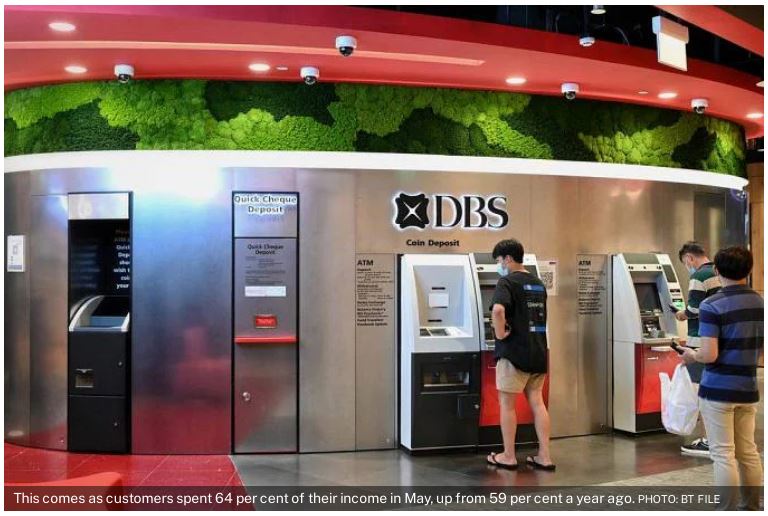Singapore: Income lags inflation for 40% of DBS’ customers; low-income group, seniors vulnerable
THE incomes of 40 per cent of DBS customers are not keeping up with inflation, the bank’s research unit said in a report on Monday (Aug 1), flagging that low-income individuals and baby boomers are particularly vulnerable.
Among customers sampled by DBS, 21 per cent had their incomes grow less than 5 per cent year on year in May, while another 19 per cent saw their income decline. Both these groups saw income growth fall behind Singapore’s average consumer price index (CPI) inflation of 5.2 per cent in the first half of 2022, as well as DBS’ 2022 CPI forecast of 5.1 per cent.
Meanwhile, expense-to-income ratios are rising. Sampled customers spent 64 per cent of their income in May, up from 59 per cent a year ago. The finding suggests that the growth rate of expenses has outpaced that of income, while pointing to pent-up spending over the past year, DBS said.
The lowest-income group suffered the greatest lag in income growth, DBS added. Those earning less than S$2,500 a month saw income grow by only 2.5 per cent between May 2021 and May 2022. “Simply put, vulnerable segments of the society are struggling most with high inflation,” the report said.
This group also saw their expenses grow 13.8 per cent, 5.6 times faster than their income growth. This is a steeper rate than for the overall sample of DBS customers, for which monthly expenses grew 22.2 per cent in May, twice the income growth of 11.1 per cent.
“We observe that the lowest income group spends almost the entirety of their income, with a significantly higher expense-to-income ratio of 94 per cent in May – versus the average of 64 per cent,” the report noted.
That said, DBS acknowledged that when factoring in upward mobility effects, the situation appears more encouraging. About 23 per cent of customers who were earning below S$2,500 in May 2021 managed to move up to higher income bands over the past year. This was amid Singapore’s economic recovery, along with the improvement in job prospects and wages.
Besides the lowest-income group, “boomers” – defined as those aged 58 to 76 years old – are also more vulnerable to inflation due to their lower “wallet bandwidth”. This group has the highest expense-to-income ratio of 96 per cent among the different generations, suggesting a lower ability to stomach inflation.
“From one regressive event to another, it seems like the odds are stacked against the financial well-being of Singaporeans,” said Irvin Seah, senior economist at DBS Group Research. “With inflationary pressures creeping up, slow wage growth and a growing propensity to “revenge-spend”, low-income earners are especially vulnerable to the ill-effects of the current economic situation.”
However, Seah noted that the recent S$1.5 billion in fiscal support for low-income earners is a “break in the clouds”. He added: “Beyond that, market volatility is driving customers to safe havens like bonds, and investments have gone up across all segments, although there is room for growth.”
Source: https://www.businesstimes.com.sg/government-economy/income-lags-inflation-for-40-of-dbs-customers-low-income-group-seniors-vulnerable


 Thailand
Thailand




